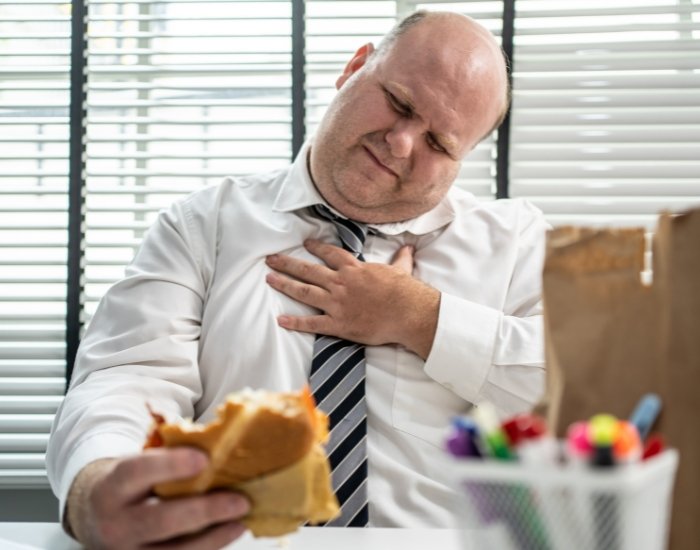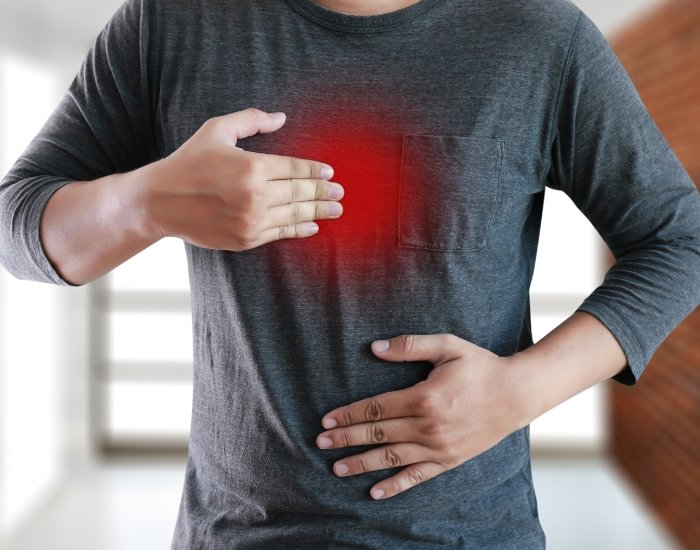If you’ve ever experienced a burning sensation in your chest after eating, you may have wondered if it’s just indigestion or something more serious. The discomfort, often described as heartburn, is a hallmark symptom of acid reflux, a condition where stomach acid flows back into the esophagus. While occasional acid reflux can be bothersome, frequent episodes can lead to more severe issues, including damage to the esophagus. Understanding how to manage and reduce the burning chest pain from acid reflux is crucial to maintaining your health and well-being.
What Is Acid Reflux and Why Does It Cause Burning Chest Pain?
Acid reflux occurs when the lower esophageal sphincter (LES)—the valve that normally prevents stomach contents from entering the esophagus—weakens or relaxes inappropriately. This allows stomach acid to travel up into the esophagus, causing irritation and inflammation. The burning sensation, commonly referred to as heartburn, occurs when this acid irritates the lining of the esophagus. If left untreated, chronic acid reflux can lead to a condition called gastroesophageal reflux disease (GERD), which can cause long-term damage to the esophagus and increase the risk of more serious health problems.

Recognizing the Symptoms of Acid Reflux
In addition to the burning chest pain, acid reflux often comes with other symptoms, including:
- Regurgitation of food or sour liquid: This is the sensation of acid or food coming back up into the throat or mouth.
- Difficulty swallowing: The esophagus may become irritated or narrowed, making swallowing difficult.
- Persistent cough: A dry cough, especially at night, can be a sign that acid is irritating your airways.
- Sore throat: Stomach acid can cause irritation in the throat, leading to a sore or scratchy feeling.
If these symptoms persist, it’s essential to address them promptly to avoid complications.
How to Stop the Burning Chest Pain from Acid Reflux
Fortunately, there are effective strategies you can adopt to alleviate the burning sensation caused by acid reflux and prevent future occurrences.
1. Modify Your Diet
Certain foods and beverages can trigger acid reflux by relaxing the LES or increasing stomach acid production. By avoiding trigger foods, you can reduce the frequency of acid reflux episodes. Common triggers include:
- Spicy foods
- Fatty or fried foods
- Citrus fruits
- Chocolate
- Caffeinated drinks
- Alcohol
Eating smaller, more frequent meals instead of large meals can also help prevent excess stomach acid from accumulating.
2. Stay Upright After Eating
After a meal, avoid lying down immediately. Lying down can make it easier for stomach acid to travel up into the esophagus. Instead, stay upright for at least two to three hours after eating. If you need to lie down at night, consider elevating the head of your bed by 6 to 8 inches to help keep stomach acid from rising during sleep.
3. Lose Excess Weight
Carrying excess weight, especially around the abdomen, can put additional pressure on the stomach and LES, contributing to acid reflux. Achieving and maintaining a healthy weight through a balanced diet and regular exercise can significantly reduce your symptoms.
4. Quit Smoking
Smoking weakens the LES and increases the production of stomach acid, both of which can contribute to acid reflux. Quitting smoking can improve the function of the LES and reduce the likelihood of acid reflux episodes.
5. Medications for Acid Reflux
In some cases, lifestyle changes may not be enough to control acid reflux. Over-the-counter medications, such as antacids, H2 blockers, and proton pump inhibitors (PPIs), can help reduce stomach acid production and alleviate symptoms. However, it’s important to use these medications under the guidance of a healthcare professional, as long-term use can have side effects.
6. Seek Professional Medical Care
If you find that the burning chest pain persists despite making lifestyle changes or using medications, it’s important to consult a healthcare provider. Untreated acid reflux can lead to serious complications, including esophagitis (inflammation of the esophagus), Barrett’s esophagus, or even esophageal cancer. A physician can diagnose the severity of your condition and recommend appropriate treatments.
Final Thoughts: Take Action to Relieve and Prevent Acid Reflux
While occasional heartburn is common, frequent or severe burning chest pain could be a sign of acid reflux or GERD, which may require medical intervention. By making simple lifestyle changes, managing your diet, and seeking professional help when necessary, you can significantly reduce the discomfort and potential long-term risks associated with acid reflux. Don’t ignore persistent symptoms—address them early to prevent complications.
At United Gastroenterology Assoc. PLLC, our team of experts is ready to help you manage acid reflux and related symptoms with personalized treatment options. Contact us today to schedule a consultation and take the first step toward relief.
Disclaimer:
The information provided in this blog is for educational purposes only and is not intended as medical advice. It should not be used to diagnose or treat any health condition. Always consult with a qualified healthcare professional for accurate diagnosis and treatment of any symptoms or medical concerns.

